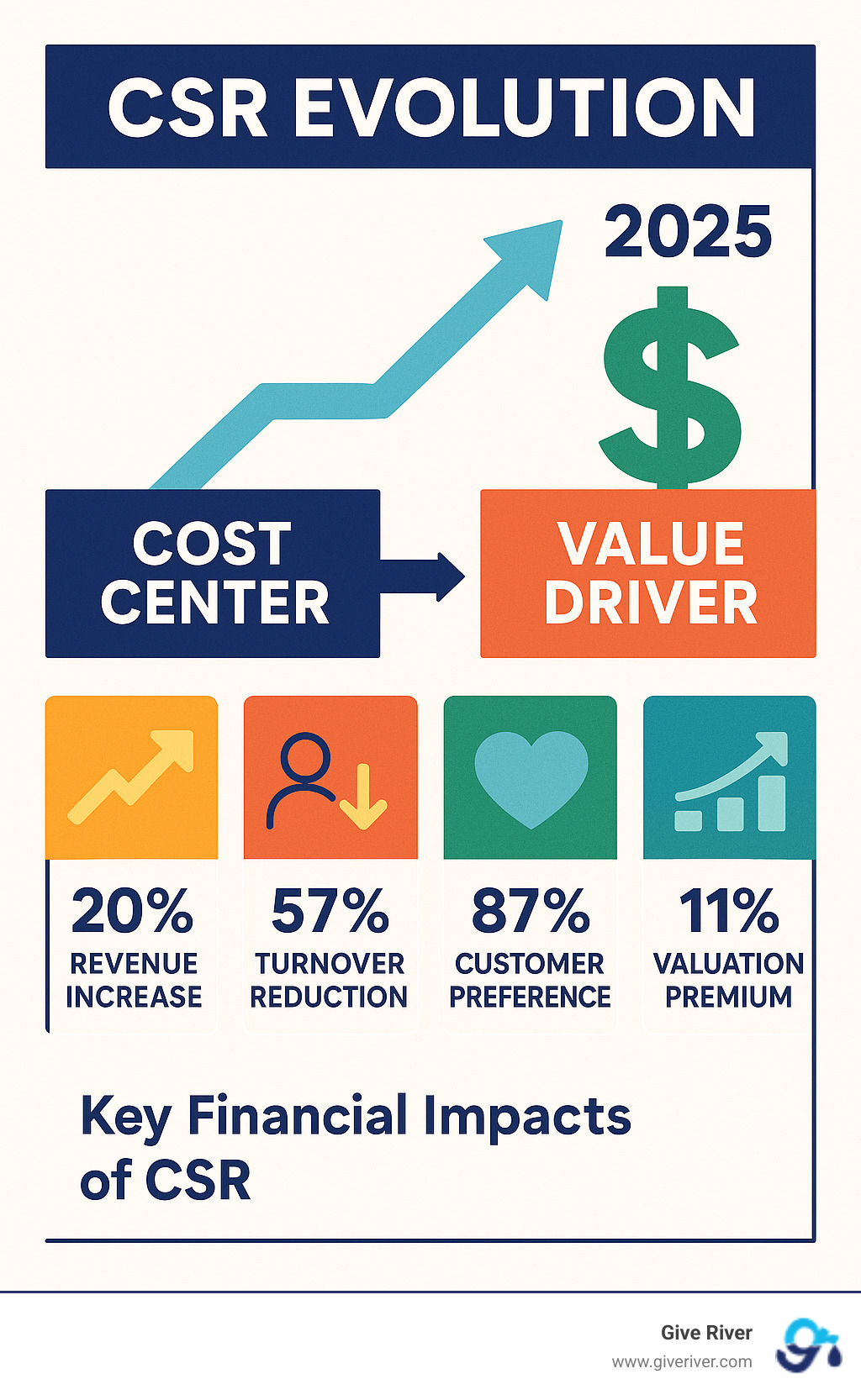The Business Case for Good: CSR's Impact on Profitability
Discover the impact of csr initiatives on a company's bottom line. Boost brand, engage staff, cut costs, and attract investors.

Beyond Philanthropy - Why CSR is a Strategic Imperative
The impact of CSR initiatives on a company's bottom line has evolved from a philanthropic nice-to-have into a critical business strategy that drives profitability. Here's how CSR creates measurable financial value:
Key Financial Impacts of CSR:
- Revenue Growth: Companies with a social purpose generate 20% more revenue.
- Employee Retention: CSR programs can reduce employee turnover by 57%.
- Customer Loyalty: 87% of Americans prefer buying from companies that align with their values.
- Investment Access: ESG-focused companies enjoy an 11% valuation premium.
- Operational Savings: Sustainable practices reduce energy, waste, and resource costs.
- Risk Mitigation: Improved CSR scores lead to better credit ratings and lower financing costs.
Gone are the days when Corporate Social Responsibility was a cost center. Today's stakeholders—from Gen Z employees to institutional investors managing over $30 trillion in sustainable investments—expect genuine social and environmental impact. This shift is why 92% of the world's largest companies now have formal CSR initiatives. It's not just about doing good; it's about doing well by doing good.
While platforms like Bonusly and Kudos focus on employee recognition, successful organizations connect engagement with broader social impact, creating a multiplier effect for people and profits. At Give River, we've seen how linking recognition with charitable giving creates a powerful synergy that drives both engagement and social good, fundamentally changing organizational culture and performance.

Simple impact of csr initiatives on a company's bottom line glossary:
The Financial Impact of CSR Initiatives on a Company's Bottom Line
When we talk about the impact of CSR initiatives on a company's bottom line, we're looking at measurable financial benefits that touch every part of your business. Think of CSR as a strategic investment that pays dividends through better customer relationships, more engaged employees, streamlined operations, and stronger investor confidence.
Boosting Brand Reputation and Revenue
In today's values-driven marketplace, 87% of Americans are more likely to buy from companies whose values align with their own. This is a roadmap to revenue growth, especially among younger consumers. Gen Z and millennials don't just buy products; they buy into a purpose, and over half of all consumers will pay more for products from companies with strong CSR strategies.
Unilever's sustainable brands, for example, grew 69% faster than the rest of their business, delivering 75% of the company's overall growth. Similarly, Patagonia built its brand on environmental and social principles, creating fierce customer loyalty and premium pricing power. A strong CSR reputation also acts as a financial shield, protecting companies from public backlash and maintaining customer trust during challenging times.
Enhancing Employee Engagement and Productivity

The impact of CSR initiatives on a company's bottom line is clear when looking at your people. CSR is a talent magnet, with 82% of Gen Z workers considering it a significant factor when choosing an employer. The retention benefits are just as powerful: companies with active CSR programs see a 57% reduction in turnover among participating employees. Considering replacement costs can be up to 200% of an employee's salary, these savings are substantial.
Beyond retention, employees aligned with company values are 17% more productive and have 41% lower absenteeism. They are more energized and engaged, creating a positive cycle of performance. CSR also aids development, as 92% of business leaders agree that volunteering improves employees' professional skills.
At Give River, we've seen how this works. Unlike platforms such as Bonusly or Kudos that focus on peer recognition, our approach connects recognition directly with charitable giving. This creates a "purpose multiplier effect," where employees feel their recognition makes a real-world difference, amplifying engagement and retention.
Achieving Operational Efficiency and Innovation
Often overlooked, the impact of CSR initiatives on a company's bottom line includes major operational improvements. When companies commit to sustainability, they often find that doing good and saving money go hand-in-hand. Resource efficiency through energy-saving tech and waste reduction programs directly lowers operational expenses.
Choosing ethical and sustainable suppliers can also optimize your supply chain, reducing risks and improving quality. Most excitingly, CSR drives innovation. Committing to social and environmental challenges forces creative thinking. Unilever's success with sustainable brands wasn't just marketing; it was driven by innovations in product formulation and packaging that resonated with consumers and boosted financial performance. This innovation mindset becomes part of the company's DNA, fostering continuous improvement.
Advantages of Corporate Social Responsibility
Attracting Investment and Mitigating Risk
In today's financial world, the impact of CSR initiatives on a company's bottom line directly affects your ability to attract capital. Environmental, Social, and Governance (ESG) investing now represents over $30 trillion worldwide. Investors actively seek strong CSR performers, and ESG leaders enjoy an 11% valuation premium over their competitors.
The risk management benefits are equally compelling. Strong CSR acts as a financial shield, leading to better credit ratings and lower borrowing costs. Research shows a single-point increase in a CSR score can significantly decrease the risk premium for bond financing. CSR also mitigates reputational risk. The Volkswagen emissions scandal is a stark reminder of how reputational damage translates into billions in losses. Companies with authentic CSR programs build trust that helps them weather such storms.
This is why 90% of S&P 500 companies now publish CSR reports, up from just 20% in 2011. It demonstrates to investors that you are proactively managing long-term risks and opportunities.
Scientific research on CSR and firm valueWhat is Corporate Social Responsibility Reporting?
Implementing CSR for Maximum Financial Return
Turning CSR's promise into reality requires more than good intentions; it demands authentic integration into your business strategy.
Overcoming Challenges and Measuring the Impact of CSR Initiatives on a Company's Bottom Line
Implementing CSR isn't always easy. The biggest problems are often the upfront investment and the difficulty of measuring ROI. Unlike sales, the benefits of CSR—like improved morale and brand loyalty—are often intangible in the short term.
Perhaps the most dangerous pitfall is greenwashing, where a company's claims don't match its actions. Authenticity is essential to avoid the kind of backlash seen in scandals like Volkswagen's emissions crisis. The key to overcoming these challenges is transparency and realistic expectations. Acknowledge that CSR is a long-term investment. Track meaningful metrics like employee retention and customer satisfaction to paint a clear picture of your program's value over time. Communicate your efforts honestly, sharing both successes and challenges to build trust.

What is the purpose of Corporate Social Responsibility?
Best Practices for Integrating CSR into Your Business Strategy
Companies that successfully leverage the impact of CSR initiatives on a company's bottom line weave it into their core strategy. Here’s how:
- Strategic Alignment: Ensure your CSR initiatives are a natural extension of your business. A tech company might focus on digital literacy, while a manufacturer might prioritize sustainable production.
- Stakeholder Engagement: Involve employees, customers, and communities in your CSR efforts. This collaborative approach ensures your initiatives address real needs and builds genuine buy-in.
- Clear Goals: Set specific, measurable targets, like reducing energy consumption by 20%. Concrete goals help track progress and demonstrate a serious commitment.
- Authentic Communication: Be specific and factual about your impact. Ensure your external messaging matches internal practices, and be humble about your journey, sharing both successes and setbacks.
- Continuous Improvement: Regularly review your CSR programs to keep them relevant and effective as social and environmental challenges evolve.
At Give River, we've seen the power of integrating these practices. Unlike recognition platforms like Bonusly or Kudos, our 5G Method connects employee fulfillment directly to community impact. This creates authentic CSR programs that employees actively participate in, creating a multiplier effect where recognition, growth, and social impact reinforce each other.
More info about Charitable Impact solutions
Conclusion
The evidence is clear: Corporate Social Responsibility has evolved from a cost center into a powerful profit driver. The impact of CSR initiatives on a company's bottom line is no longer a question—it's a strategic advantage that improves revenue, talent retention, and investor confidence.
The market is demanding authentic CSR. A new generation of employees and consumers chooses to work for and buy from brands that align with their values. While implementation has its challenges, overcoming them creates a competitive edge that is difficult to replicate.
The most successful companies integrate social impact into their daily operations, creating a virtuous cycle where purpose and profit fuel each other. They don't just run a separate charity drive; they make doing good part of how they do business.
At Give River, we see this change daily. While platforms like Bonusly or Kudos focus on internal appreciation, our approach connects employee recognition with tangible community impact. When employees feel valued and see their work contributing to meaningful causes, engagement and retention soar, shifting the entire culture toward purpose and collaboration.
The future belongs to businesses that understand this: the impact of CSR initiatives on a company's bottom line is about building a resilient organization that attracts top talent, inspires customer loyalty, and creates lasting value. Your next move is to take an authentic step—no matter how small—toward a stronger bottom line and a better world.




